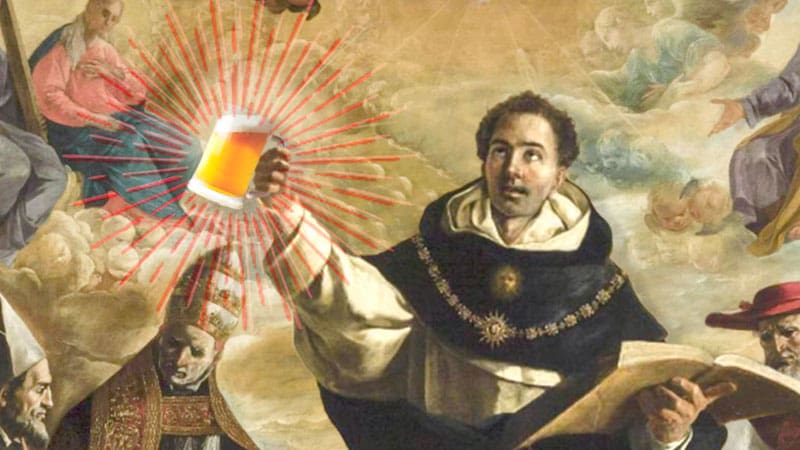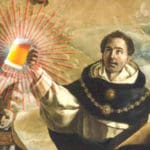Today I chat with Dr. Robert Delfino about Thomas’ 5th argument for God’s existence.
—
PintsWithAquinas.com
Patreon.com/PWA
—
Here is the translation from the Fathers of the English Dominican Province (ST 1, Q. 2, A. 3.):
“The fifth way is taken from the governance of the world. We see that things which lack intelligence, such as natural bodies, act for an end, and this is evident from their acting always, or nearly always, in the same way, so as to obtain the best result. Hence it is plain that not fortuitously, but designedly, do they achieve their end. Now whatever lacks intelligence cannot move towards an end, unless it be directed by some being endowed with knowledge and intelligence; as the arrow is shot to its mark by the archer. Therefore some intelligent being exists by whom all natural things are directed to their end; and this being we call God.”
Here’s Delfino’s translation:
The fifth way is taken from the governance of things. For we see some things that lack knowledge, namely natural bodies, act for the sake of some end. This is apparent from the fact that they always or most often act in the same way and achieve what is best [i.e., what fulfils their natural needs]. From this it is obvious that they achieve their end not by chance but by natural inclination (ex intentione). But those things that lack knowledge do not tend toward an end except under the direction of something with knowledge and intelligence, as in the case of an arrow from an archer. Therefore there is some intelligent being by whom all natural things (omnes res naturales) are ordered to an end, and this we call God.
—
Defino’s 10 step argument:
1. We see in nature that non-intelligent things act for a goal that is good with regularity. For example, it is in the nature of an electron to be attracted to protons, which helps to form atoms.
2. If electrons did not have this natural inclination then none of the elements on the periodic table you studied in Chemistry would form, which would mean that none of the physical life forms we know (including yourself!) would exist anywhere in the physical universe. But that would be bad, because life is good.
3. In the case of electrons being attracted to protons, we cannot ascribe such behavior to chance or to biological evolution. In the case of chance, chance would not explain why the electrons act with such regularity because chance refers to what happens rarely.
4. In the case of biological evolution, this is because the regularity of action in the case of electrons exists prior to biological evolution and is necessary in order to make biological evolution possible.
5. An intelligent cause can direct something for a goal that is good with regularity. For example, consider an archer who, with routine success, directs his arrows towards the animals he is hunting for food. However, these regular actions of the arrows, which are made of wood, do not represent the natural actions of wood. Instead, they represent something imposed on the wood of the arrows by the archer. This is similar to how a puppeteer imposes movement on a puppet, and how a watchmaker orders the part of a watch to tell time.
6. An intelligent cause is able to do this because having intelligence allows one to envision something mentally that does not yet exist physically (for example, envisioning a watch before it was invented). Non-intelligent matter cannot order itself to an end that is good precisely because it is incapable of thought.
7. However, human intelligence cannot explain why an electron has, within its own nature, an inclination to be attracted to protons because electrons exist prior to humans and humans could not exist without electrons already having these natural inclinations.
8. In our attempt to explain why electrons, as non-intelligent beings, have a natural inclination to be attracted to protons, which makes life possible, we have ruled out the material aspect of the electron, chance, biological evolution, and human intelligence.
9. Therefore, there must be some non-human intelligence that is responsible for the natural inclinations of electrons.
10. This non-human intelligence cannot achieve this by imposing activity on the electron in a manner similar to a puppeteer or a watchmaker. Instead, this non-human intelligence must be capable of endowing an electron with its being and nature.
Conclusion: We call this non-human intelligence God.
—
Thanks to the following patrons of Pints With Aquinas
Jed Florstat
Daniel Szafran
Phillip Hadden
Katie Kuchar
Phillipe Ortiz
Malcolm Paul MacDonald
Nick Sungenis
Kevin Donaoe
Dennis Mahoney
Katherine Szojka
Shawn Pierce




Reader Interactions